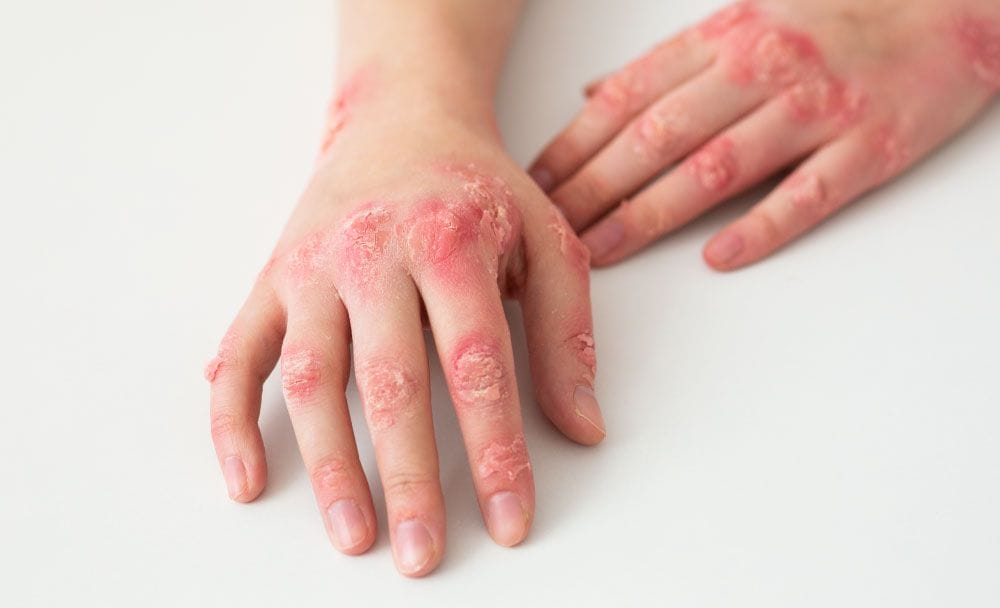
Syphilis is a sexually transmitted infection caused by the bacterium Treponema pallidum. It can have severe consequences if left untreated, including damage to the brain, heart, and other organs. [1] [2] This article will provide an overview of Syphilis, including its symptoms, causes, stages, and treatment options.
Symptoms of Syphilis?
Syphilis symptoms can vary depending on the stage of the infection. The disease has four stages: primary, secondary, latent, and tertiary.
Primary Syphilis
The primary stage of Syphilis typically begins with a small, painless sore (called a chancre) that appears on or near the genitals, anus, or mouth. The sore usually heals within a few weeks, but the infection progresses if left untreated. [2] [3]
Secondary Syphilis
During the secondary stage of Syphilis, a rash may appear on the palms of the hands or the soles of the feet. Other symptoms may include fever, fatigue, sore throat, hair loss, and swollen lymph nodes. These symptoms can come and go over several weeks or months. [2] [3]
Latent Syphilis
The absence of symptoms characterizes the latent stage of Syphilis. The infection is still present in the body, but it is not causing any noticeable symptoms. This stage can last for several years. [2] [3]
Tertiary Syphilis
Tertiary Syphilis is the most severe stage of infection. It can lead to serious complications, such as damage to the brain, heart, and other organs. Symptoms may include difficulty coordinating muscle movements, paralysis, blindness, and dementia. [2] [3]
What Causes Syphilis?
Syphilis is caused by the bacterium Treponema pallidum. The bacterium can be transmitted from one person to another through sexual contact (including oral, vaginal, and anal sex) or by coming into contact with an open sore or rash caused by the infection. [1] [2]
Syphilis can also be passed from a pregnant woman to her unborn baby. This is known as congenital Syphilis and can cause serious health problems for the baby. [3] [4]
How is Syphilis Diagnosed?
Syphilis can be diagnosed through a blood test or a sample of fluid from a sore or rash. It is essential to get tested regularly if you are sexually active, especially if you have multiple sexual partners. [1]
What is the Treatment for Syphilis?
Syphilis is treated with antibiotics, usually penicillin. The type and duration of treatment depend on the stage of the infection. For example, a single injection of penicillin may be enough to treat early-stage Syphilis, while multiple doses may be necessary for more advanced cases. [1] [2]
It is essential to complete the entire course of antibiotics your doctor prescribes, even if your symptoms disappear. This will help ensure that the infection is completely cleared from your body. [1] [2]
Ayurvedic knowledge of Syphilis
Acharya Bhavamisra was the first author to refer to a disease called ‘Phirangaroga’ in Ayurvedic literature in his Ayurvedic compendium named ‘Bhavaprakasa.’ This term is believed to be the contemporary name for Syphilis, brought to India by Europeans.
The word ‘Phiranga’ in many Indian languages denotes Europeans in general and Portuguese in particular in this instance. [5]
Bhavamisra included certain drugs of foreign origin in his material, such as Chop Cheeni (Madhusnuhi), a root imported from China that is indicated in the treatment of Phiranga Roga. He also mentioned Opium (Ahiphena), its preparation method, and the use of camphor from China and Parasika Yavani from Persia. Additionally, Bhavamisra was the first to mention using mercurial compounds in treating Phiranga Roga. [5]
FAQs on Syphilis
1. Can Syphilis be cured?
Yes, Syphilis can be cured with antibiotics, but it is essential to get tested and treated as soon as possible to avoid serious complications.
2. Can Syphilis be transmitted through kissing?
It is possible for Syphilis to be transmitted through kissing if one of the partners has a sore or rash in or around their mouth.
3. How can I prevent Syphilis?
The best way to prevent Syphilis is to practice safe sex by using condoms and limiting the number of sexual partners you have. Getting tested regularly for sexually transmitted infections is also important.
4. What are the long-term effects of untreated Syphilis?
Untreated Syphilis can lead to serious health problems, including damage to the brain, heart, and other organs. In some cases, it can be fatal.
5. How soon after exposure to Syphilis will symptoms appear?
Symptoms of Syphilis can appear as soon as ten days after exposure to the infection, but they may not appear for several weeks or months. In some cases, there may be no symptoms at all.
Conclusion
Syphilis is a severe sexually transmitted infection that can have serious consequences if left untreated. The best way to prevent Syphilis is to practice safe sex and get tested regularly for sexually transmitted diseases. If you suspect that you may have Syphilis, it is essential to see a healthcare provider as soon as possible to get tested and treated.
Disclaimer: This article is from a medical and informational perspective only and does not constitute medical advice. Kindly seek the help of a trained medical practitioner before initiating any treatment.
















